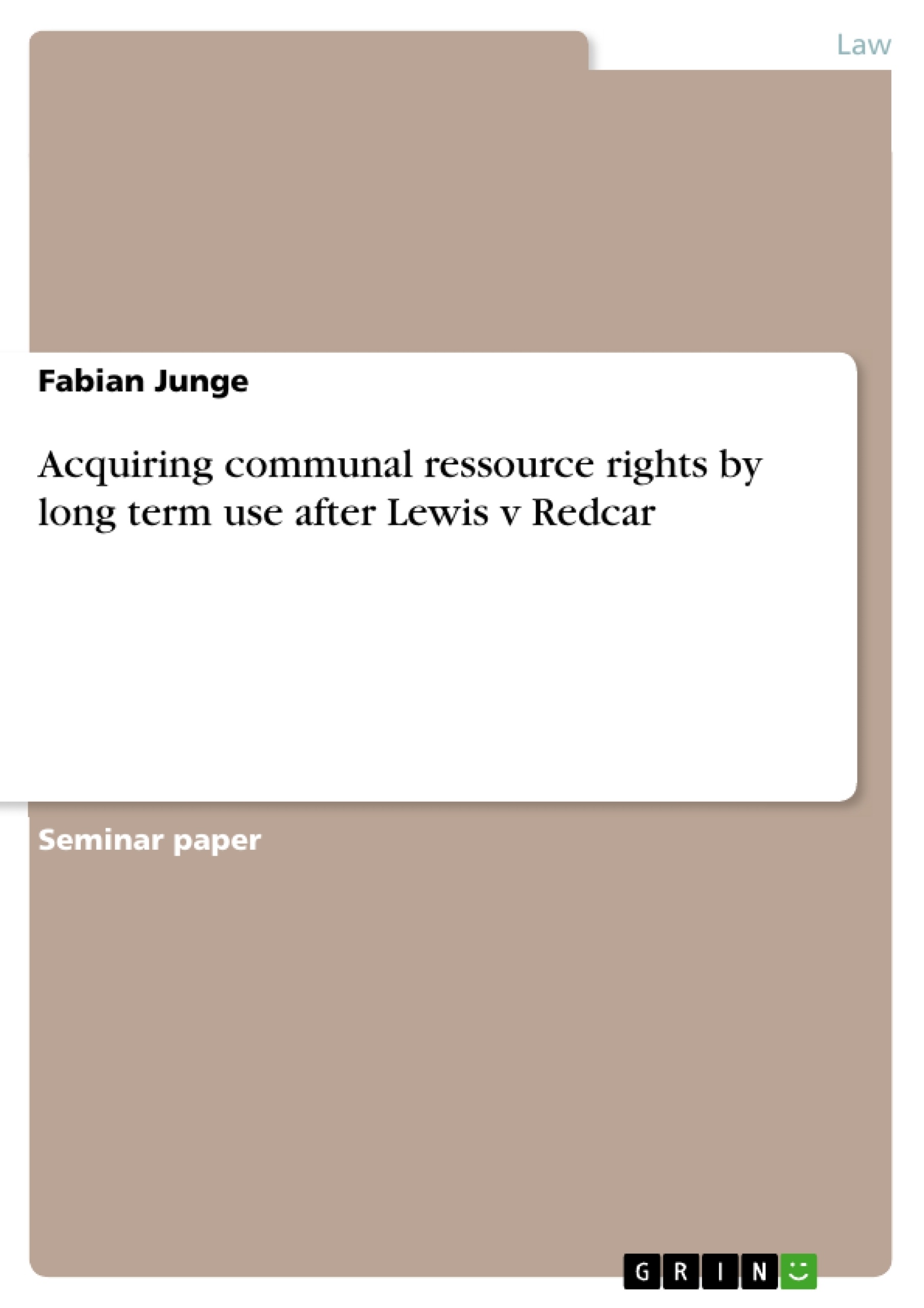To work out the details on how to acquire communal resource rights by long term use we first have to examine the question what are communal resource rights exactly. Due to the fact that there is no possibility for a community to own land or to hold fee simple estates in land, English Law has developed limited access “communal property rights”. These rights can be exercised over areas known as commons.
Commons have their origin in the agricultural tradition that has been established in the late 11th century to use the harvested fields together for common grazing of the animals of all members of a locality. Out of these local customs evolved the so called “rights of common” as part of the communal property rights. They are held by distinct individuals of a community and include rights such as fishing, grazing or to collect firewood which can be asserted by them.
Over time, the use of particular rights of common decreased due to the industrialization. The changing reliance of the people on certain resources such as timber and the second communal property rights called customary rights of fluctuating bodies gained in importance. They can only be acquired by custom or by long use and have the peculiarity that they can be exercised, once they have been established, by anybody independently of ownership as long as he belongs to the particular local community.
One of the most frequently exercised customary rights is the right of recreational use on which this paper puts the focus on. This use has been very limited in the history of English law, but in the 13th century some land has been increasingly used by the local inhabitants for recreation or sports and the courts started to declare a land as town or village green with protection from interference if a long term use could be verified.
Since the 19th century the centre of gravity shifted from the agricultural benefits of town or village greens to the recognition of the large general public interest in recreation and the countryside. This development culminates after various other statutory provisions in favor of the protection of town or village greens in the Commons Registration Act in 1965.
Inhaltsverzeichnis (Table of Contents)
- A. Preliminary Considerations
- B. Acquiring communal resource rights by long term use
- I. Case facts of Lewis v Redcar
- II. The outcome of Lewis v Redcar in the context of other decisions...
- 1. Section 15 of the Commons Act 2006......
- a. A significant number of inhabitants
- b. Locality or neighborhood within a locality
- c. Indulgence in lawful sports and pastimes
- d. The 20-year-period
- e. As of right
- 2. Rights of use after registration
- 3. Measures for preventing a registration as a town or village green
- 1. Section 15 of the Commons Act 2006......
- C. Conclusion
Zielsetzung und Themenschwerpunkte (Objectives and Key Themes)
This term paper aims to analyze the process of acquiring communal resource rights by long-term use in light of the landmark case of Lewis v Redcar. The paper examines the case facts, its legal implications, and its impact on existing legislation, specifically Section 15 of the Commons Act 2006.
- The legal framework for acquiring communal resource rights by long-term use
- The significance of the Lewis v Redcar case
- The application of Section 15 of the Commons Act 2006 in practice
- The impact of the decision on future claims for village green status
- The interplay between legal precedent and statutory interpretation
Zusammenfassung der Kapitel (Chapter Summaries)
- The first chapter provides a brief overview of the legal framework governing the acquisition of communal resource rights by long-term use, laying the foundation for the subsequent analysis.
- The second chapter delves into the facts of the Lewis v Redcar case and analyzes the Court's reasoning and decision, highlighting its significance in the context of existing legal precedents.
- The third chapter examines the implications of the Lewis v Redcar decision for Section 15 of the Commons Act 2006, analyzing its application in practice and discussing potential challenges and opportunities for future claims.
Schlüsselwörter (Keywords)
The central keywords of this term paper are: communal resource rights, long-term use, Lewis v Redcar, Section 15 of the Commons Act 2006, village green status, legal precedent, statutory interpretation, and the acquisition of rights by prescription.
Frequently Asked Questions
What are communal resource rights in English Law?
They are limited access property rights, such as grazing, fishing, or collecting firewood, held by members of a local community over areas known as commons.
What was the significance of the Lewis v Redcar case?
It is a landmark case regarding the acquisition of communal resource rights, specifically recreational use, through long-term prescription.
How long must land be used to claim village green status?
Under Section 15 of the Commons Act 2006, a 20-year period of continuous use is generally required.
What does "as of right" mean in this legal context?
It means the use must occur without force, without secrecy, and without the express permission of the landowner.
Can anybody exercise customary rights?
Customary rights can be exercised by anyone belonging to the particular local community, independently of land ownership, once established.
- Citation du texte
- Fabian Junge (Auteur), 2011, Acquiring communal ressource rights by long term use after Lewis v Redcar, Munich, GRIN Verlag, https://www.grin.com/document/178385



